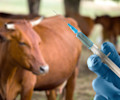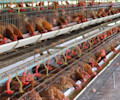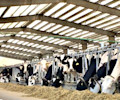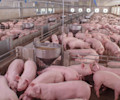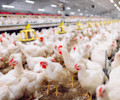New research from $16 trillion-backed FAIRR investor network analyses 60 of largest global meat, fish and dairy producers on environmental and social issues
Suppliers to McDonalds, Tesco, Nestlé and Walmart ranked as worst offenders in areas such as greenhouse gases, antibiotics and deforestation.
77% of major meat, fish and dairy producers do not measure all greenhouse gas (GHG) emissions and do not have meaningful targets to reduce them. Undermining climate commitments of high-street brands.
Norwegian fish farmers Mowi and New Zealand-based dairy cooperative Fonterra are best performers in Index; with four poultry firms in bottom five, including Venky’s India and Cal-Maine Foods (US).
(London, 04 September 2019), New research for the Coller FAIRR Protein Producer Index today finds that the world’s largest meat, fish and dairy producers are failing to match the sustainability commitments of the high-street brand names they supply, including McDonalds, Tesco, Nestlé and Walmart.
The Index assesses 60 publicly-listed animal protein producers with a combined market cap of $324bn. These firms provide much of the meat, fish and dairy used in the burgers, nuggets and ready-meals placed on tables and supermarket shelves around the world. The Index is the world’s only comprehensive assessment of how the factory farming sector performs against critical sustainability risks.
This year’s Index finds that 77% of producers do not measure all their GHG emissions and do not have meaningful targets to reduce them. These include Venky’s (India) and Hormel Foods (US) – both suppliers to McDonalds; LDC (France) – a supplier to Nestlé; and Cal-Maine Foods (US) – the largest producer of fresh eggs in the US and a significant supplier to Walmart. Nestlé, McDonald’s and Walmart have all publicly committed to reduce GHG emissions.
Walmart aspires to zero net deforestation in its supply chain by 2020; however suppliers such as Sanderson Farms (US) and Cranswick (UK) fail to report any commitments on deforestation according to the Index. McDonalds and Yum! Brands have pledged to reduce antibiotics use in their beef supply chains. But the vast majority of beef suppliers do not have a policy to avoid routine use of antibiotics – only one (Marfrig) does.
Jeremy Coller, Founder of FAIRR and Chief Investment Officer at Coller Capital, said:
“From cage-free eggs to plant-based burgers, high-street food brands have made bold commitments on sustainability in recent years.
“It is the companies hidden upstream in the meat and dairy supply chain who face the most significant climate and public health risks. Our research shows that the largest animal protein producers have failed to deliver any solutions. These companies urgently need to address issues such as climate risk, deforestation and antibiotic use to future proof their own business models and to prevent the commitments of their customers, the high-street brands, from becoming nothing but fake promises.”
“As last month’s landmark report from the Intergovernmental Panel on Climate Change (IPCC) demonstrated, the world’s meat, fish and dairy industries are under serious threat from climate change impacts. The weight of evidence highlighted by the Coller FAIRR Index has left investors concerned that the sector is failing to act. In stark contrast to the transport sector, only one in four meat, fish and dairy producers even measure their greenhouse gas emissions, let alone act to reduce them. The Paris agreement is impossible to achieve without tackling factory farm emissions. Coal is a stranded asset, and cows are the new coal.”
The full ranking of the 60 firms is available below. The research is produced by the **$17.1 trillion-**backed investor network FAIRR which counts large investors such as UBS Asset Management, BMO Global Asset Management and Robeco among its members.
Other findings in the Index include:
The meat, fish and dairy sector as a whole performs poorly: 65% (39 of 60) of companies are ranked in the bottom ‘high risk’ category for overall performance across all sustainability criteria.
Plant-based investments booming: 25% of animal protein producers (15 of 60 firms) now have some investments in alternative proteins such as ‘plant-based meats’. This includes traditional meat companies such as JBS, Tyson and Marfrig. Best alternative proteins performers are Maple Leaf Foods (CAN), Tyson Foods (US) and China Mengniu Dairy.
Deforestation: None of the 50 meat and dairy companies (excluding fish farmers) have a comprehensive policy to address or mitigate deforestation in all regions in which they source soy and/or cattle.
Water pollution: 94% of meat and dairy companies are ranked in the bottom ‘high risk’ category for water pollution.
Antibiotics: 77% of companies (46) are ranked in the bottom ‘high risk’ category for management of 22 firms have no policy on antibiotics use.
Animal welfare: Over 75% of meat and dairy companies (38) and 60% of fish farming companies (9) are ranked in the ‘high risk’ category for animal welfare.
Worker safety: 32% of companies fail to disclose basic metrics on worker safety such as work-related injuries and fatalities. In the US, serious injuries are three times higher in meatpacking than in any other industry.
Asia is the poorest performing region and Europe the best. Of the bottom 20 performing firms, 75% are from Asia (including Oceania).
Last month’s landmark IPCC report warned that industrial livestock systems “will suffer most” from indirect climate change impacts. The Coller FAIRR Index evidences this finding by showing how meat and dairy producers are already counting the cost of climate change, including:
Australian Agricultural Company, Australia’s biggest beef company, which suffered losses of over $100 million in 2018/19, partially due to extreme weather events.
Cal-Maine (US), which reported a 30% decline in Q4 revenues compared to last year partially due to historic rainfall.
QAF, the Singapore food firm with hog farms in Australia, which saw feed prices rise 55% in 2018 due to increased droughts.
Investor comments
Juan Salazar, Director, Responsible Investment, BMO Global Asset Management
“Climate change is putting dire pressure on the ability of the meat, fish and dairy industries to meet global demand for protein. The message from an increasing number of investors is that the food industry must find better answers to the business risks it is facing from more extreme weather patterns and increasing water scarcity. As a first step meat, fish and dairy suppliers must start to echo and act on the commitments some of their big customers are making, for example reducing emissions in line with the volumes demanded by climate science.”
Karianne Lancee, Sustainable Investing Research Analyst, UBS Asset Management
“UBS Asset Management is committed to integrating sustainability into investment decisions. ESG data and transparency from companies are crucial in this process. The fact that over three-quarters of major meat, fish and dairy producers are not fully tracking emissions, or reporting on issues such as water use and deforestation presents a challenge to investors in evaluating investment risks and opportunities. The Coller FAIRR Index is an important tool to help investors close a knowledge gap and better identify the environmental and health risks hidden in big food’s labyrinth supply chains.”
Eva Cairns PRM, ESG Investment Analyst – Climate Change, Aberdeen Standard Investments*
“Only last month the world’s leading climate science body, the IPCC, warned that the animal agriculture industry, particularly meat and dairy, is a significant contributor to global warming. It is also at risk from the accelerating physical impacts of climate change. Feeding a growing population will require much more sustainable meat and dairy production. FAIRR’s research shows less than one in three of the firms supplying the meat for global retailers and restaurants have set targets to reduce emissions, and most do not measure the greenhouse gases they are responsible for. That creates enormous environmental and financial risks given that livestock release more emissions than all cars, planes and trains combined. Investors need to understand these risks and better industry disclosure is needed. The impact of agriculture and food production on climate change has long been overlooked and needs a lot more attention now. The food industry must step up to the plate and make its meat and dairy supply chain more sustainable. “
Peter van der Werf, Senior Engagement Specialist, Active Ownership, Robeco
“The environmental, economic and public health risks associated with animal agriculture are significant. Robeco has engaged since 2016 with the food industry to strengthen their innovation management, product safety and quality management including use of antibiotics, labor standards and animal welfare. While most companies have made commitments as result of our dialogue it is clear that the global demand for meat continues to result in issues that are of concern to consumers, such as animal welfare and deforestation that leads to climate change. The industry needs to respond to the developments around changing consumer habits with diversification into plant-based alternatives and cultured meat”
Faryda Lindeman, Senior Responsible Investment Specialist, NN Investment Partners
“Curbing the enormous environmental impact of meat, fish and dairy production is essential to avoid climate change. We are starting to see other high-emitting industries like energy and extractives start to transition to a low-carbon economy, but the global food sector is being left behind. That generates enormous risk from the stock market to the supermarket shelf.”
Luisa Flores, Head of SRI, La Banque Postale Asset Management
“FAIRR’s new research on the sustainability performance of meat and dairy suppliers is helping investors to understand the material risks that must be managed in the food sector. Just as important, it is also enabling a race to the top by showing the best practice that is possible to help tackle climate change, reduce antibiotic use and better manage scarce natural resources such as water. Companies that fail to manage critical sustainability issues may risk restricted access to capital due to reputational damage and regulatory backlash.”
Herve Guez, CIO, Mirova
“Today’s food system has contributed to the major environmental and social challenges we face currently such as climate change, deforestation and antibiotic resistance. To ensure their future operations in this changing world, food production companies must then address these issues. The Coller FAIRR Index will help investors like ourselves better understand how these companies are adapting their business models to manage these issues and where they can improve.”
Bertille Knuckey, Head of Sustainable & Responsible Investment, Sycomore Asset Management
Alors que la résistance aux antibiotiques, d’ores et déjà responsable de 700 000 décès par an, pourrait couter 10 million de vies en 2050 et conduire à une chute du PIB annuel mondial entre 1,1% et 3,8%, seuls quatre des 60 plus gros producteurs de protéines mondiaux ont décidé d’arrêter l’utilisation systématique d’antibiotiques. Sycomore AM va redoubler d’effort pour encourager les entreprises concernées à améliorer leurs pratiques et rechercher activement des solutions. A travers FAIRR, tous les investisseurs peuvent unir leurs forces afin d’éliminer ce risque systémique pour la société.
Patrick Peura, ESG Engagement Manager, Allianz
“Investors need more systematic, clear and comprehensive information on how food and agricultural companies manage Environmental, Social and Governance (ESG) issues. The research from the Coller FAIRR Index is a step in the right direction and it helps shine a light on the complex ESG issues faced by food and agricultural companies. With the help of FAIRR’s research, Allianz can better engage in dialogues with the relevant companies in our portfolio to encourage improved ESG performance.”
Jerry Goh, Investment Manager, Aberdeen Standard Investments
“The research for the Coller FAIRR Index gives us valuable insights into the $320 billion animal agriculture supply chain. It tells us that Asia food companies have been beneficiaries from the growth in global protein consumption, whilst highlighting the negative environmental and public health impacts for the animal agriculture sector. It is good news to see leaders emerge in Asia, with three Asian firms in the top 10 global meat and dairy companies for their management of sustainability issues. But the research also informs that investors need to engage Asia’s protein producers to be more aware of food safety and practices, and to develop more sustainable business operations to better manage their long-term risks.”
Notes to editor
For more information or for exclusive interviews with Aarti Ramachandran Head of Research and Corporate Engagement at FAIRR or investors involved, please contact:
Conor Quinn, ESG Communications, t: + 44 (0)7413 636323 | e: conor@esgcomms.com;
A full report with all results and details of the Coller FAIRR Index is available on request. The overall league table of results is below. Methodology: All companies are given an overall ranking of ‘low’, ‘medium’, ‘high’ risk’ or ‘best practice’, based on their scores against nine sustainability factors. These are: Greenhouse gas emissions; Deforestation and biodiversity loss; Water scarcity and use; Waste and pollution; Antibiotics; Animal welfare; Working conditions, Food safety, and alternative proteins. A full methodology is available in the Index report or online. All valuations are based on market capitalization figures as of May 31st 2019.
* Aberdeen Standard Investments is a global asset manager dedicated to creating long-term value for our clients. With over 1,000 investment professionals, we manage £525.7 billion of assets worldwide. We have clients in 80 countries supported by 52 relationship offices. This ensures we are close to our clients and the markets in which we invest. (*as of 30 June 2019). We are high-conviction, long-term investors who believe teamwork and collaboration are the key to delivering repeatable, superior investment performance. Standard Life Aberdeen plc is headquartered in Scotland. It has over 1 million shareholders and is listed on the London Stock Exchange. You can access the Aberdeen Standard Investments media centre here
Overall league ranking
Rank
Company name
Market cap (US$ billion)
Country
Ranking
1
Mowi ASA
11.96
Norway
Low risk
2
Fonterra Co-operative Group Ltd
4.20
New Zealand
Low risk
3
Lerøy Seafood Group ASA
4.08
Norway
Low risk
4
Bakkafrost P/F
2.59
Faroe Islands
Low risk
5
Tyson Foods Inc
27.69
USA
Low risk
6
Grieg Seafood ASA
1.58
Norway
Medium risk
7
Maple Leaf Foods Inc
2.80
Canada
Medium risk
8
Tassal Group Ltd
0.60
Australia
Medium risk
9
SalMar ASA
5.18
Norway
Medium risk
10
Charoen Pokphand Foods PCL
7.57
Thailand
Medium risk
11
Marfrig Global Foods SA
1.08
Brazil
Medium risk
12
Hormel Foods Corp
21.15
USA
Medium risk
13
China Mengniu Dairy Co Ltd
14.36
China
Medium risk
14
Salmones Camanchaca SA
0.54
Chile
Medium risk
15
Grupo Nutresa SA
3.39
Colombia
Medium risk
16
Cranswick PLC
1.75
UK
Medium risk
17
WH Group Ltd
13.24
China
Medium risk
18
BRF SA
5.74
Brazil
Medium risk
19
JBS S.A.
15.20
Brazil
Medium risk
20
Thai Union Group PCL
2.74
Thailand
Medium risk
21
Empresas AquaChile SA
0.80
Chile
Medium risk
22
GFPT PCL
0.63
Thailand
High risk
23
Vietnam Dairy Products JSC
9.63
Vietnam
High risk
24
Scandi Standard AB
0.43
Sweden
High risk
25
Minerva SA
0.79
Brazil
High risk
26
MHP SE
1.15
Ukraine
High risk
27
LDC SA
2.08
France
High risk
28
Bell Food Group AG
1.85
Switzerland
High risk
29
Inner Mongolia Yili Industrial Group Co Ltd
26.50
China
High risk
30
NH Foods Ltd
4.17
Japan
High risk
31
Astral Foods Ltd
0.49
South Africa
High risk
32
RCL Foods Ltd/South Africa
0.92
South Africa
High risk
33
Muyuan Foodstuff Co Ltd
19.13
China
High risk
34
Almarai Co JSC
13.60
Saudi Arabia
High risk
35
Sanderson Farms Inc
3.03
US
High risk
36
Prima Meat Packers Ltd
0.99
Japan
High risk
37
Great Wall Enterprise Co Ltd
0.96
China
High risk
38
Beijing Sanyuan Foods Co Ltd
1.22
China
High risk
39
China Modern Dairy Holdings Ltd
0.80
China
High risk
40
New Hope Liuhe Co Ltd
12.58
China
High risk
41
Seaboard Corporation
4.78
US
High risk
42
COFCO Meat Holdings Ltd
1.38
China
High risk
43
Japfa Ltd
0.74
Singapore
High risk
44
Nippon Suisan Kaisha Ltd
1.90
Japan
High risk
45
Inghams Group Ltd
1.08
Australia
High risk
46
QAF Ltd
0.32
Singapore
High risk
47
QL Resources Berhad
2.65
Malaysia
High risk
48
Grupo Bafar SAB de CV
0.66
Mexico
High risk
49
San Miguel Food and Beverage Inc
12.17
Philippines
High risk
50
Thaifoods Group PCL
0.53
Thailand
High risk
51
Chuying Agro-pastoral Group Co Ltd
0.55
China
High risk
52
Fortune Ng Fung Food Hebei Co Ltd
1.28
China
High risk
53
Wens Foodstuff Group Co., Ltd.
30.32
China
High risk
54
Cherkizovo Group PJSC
1.09
Russia
High risk
55
Australian Agricultural Co Ltd
0.46
Australia
High risk
56
Fujian Sunner Development Co Ltd
5.00
China
High risk
57
Beijing Shunxin Agriculture Co Ltd
4.43
China
High risk
58
Venky’s India Ltd
0.39
India
High risk
59
Industrias Bachoco SAB de CV
2.63
Mexico
High risk
60
Cal-Maine Foods Inc
1.80
US
High risk
About FAIRR
The FAIRR Initiative is a collaborative investor network, established by the Jeremy Coller Foundation. Its mission is to build a global network of investors who are focused and engaged on the risks linked to intensive animal production within the broader food system. FAIRR helps investors to exercise their influence as responsible stewards of capital to engage and safeguard the long-term value of their investment portfolios. This is the second year of the Coller FAIRR Protein Producer Index, which was shortlisted by the UN-supported Principles for Responsible Investment as ESG Research Report of the Year for 2018**.** www.fairr.org
